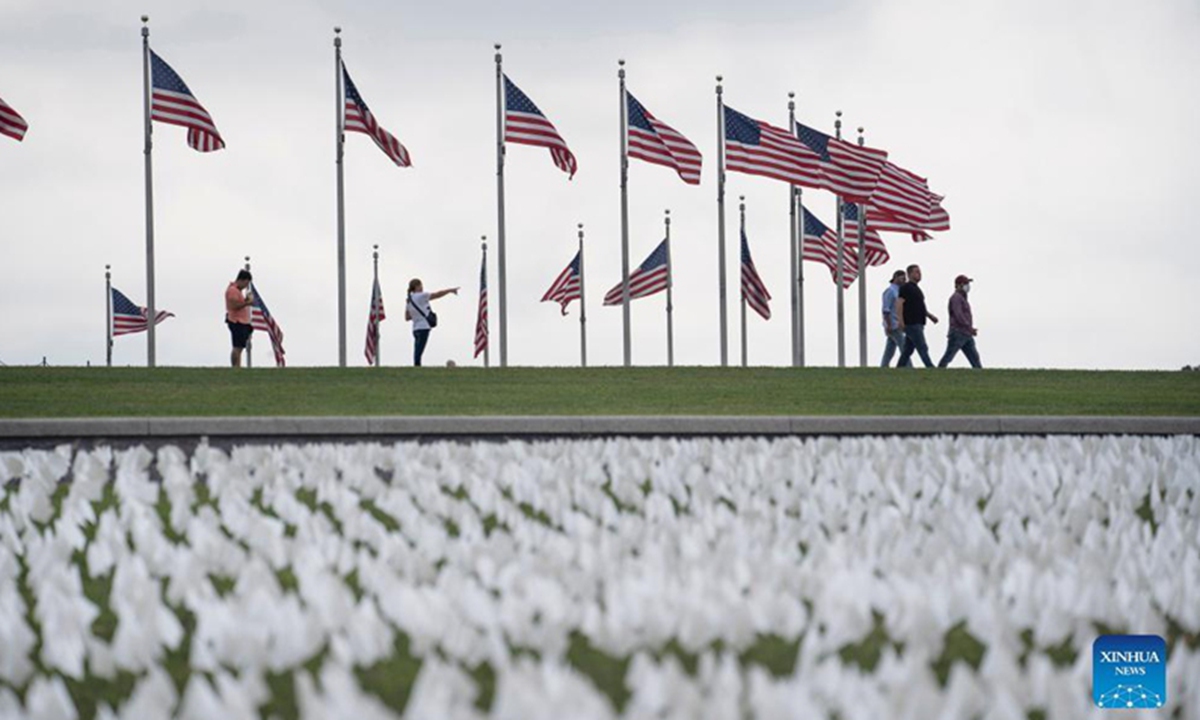
White flags are seen on the National Mall in Washington, D.C., the United States, on September 16, 2021. More than 660,000 white flags were installed here to honor the lives lost to COVID-19 in the United States.Photo:Xinhua
Due to the US government's failure to combat the epidemic, some 200,000 US children were orphaned by COVID-19, according to an Atlantic Monthly article. One out of every 12 orphans under the age of 18 suffers the caregiver loss because of the epidemic, and in every public school in the US, on average two children have lost a caregiver to the epidemic. The article commented that even after two years that have inured the country to the carnage of the coronavirus, the scope of the loss is so staggering that it can be hard to comprehend.
The distribution of data shows that children of racial and ethnic minorities account for 65percent of those who lost a primary caregiver. Compared to white children, Hispanic children were 1.8 times more likely to lose a parent or grandparent caregiver, Black children were 2.4 times more likely, and native American/Alaska Native children were 4.5 times more likely. Nearly half of the children who lost their caregivers are concentrated in California, Texas, New York, Florida, Arizona and Georgia, six states with large populations living under poverty line.
This is a silent lament about the intergenerational transmission of poverty and the spiral of social inequality in the US. Most of the 200,000 orphans have been at the bottom of American society since birth and have had few opportunities to change their fate. The epidemic even robbed them of their parents, leaving them in a darker and more helpless place with the risk of dropping out of school, drug abuse, and violence likely to follow them throughout their lives. As Susan Hillis, a co-chair of the Global Reference Group on Children Affected by COVID-19, puts it, "it's not like you're an orphan today and then you're recovered in two weeks."
However, the lives of ordinary US citizens lost in the epidemic have attracted less and less social attention, as Washington has concentrated more on Wall Street figures and even foreign geopolitical games. In the rush to declare the "end" of the COVID-19 epidemic, those trapped in the pain of the epidemic have been forgotten, intentionally or not.
This seems natural in the US system, as orphans have no political spokespersons, no lobbying capital, and no right to vote, so how can they expect the lawmakers to speak for them? But should they be abandoned because they have no capital and no votes?
The US federal government has handed out trillions of dollars in bailouts since the outbreak of the epidemic, and the wealthiest have even increased their fortune by 50 percent during the epidemic. However, there has been no law or executive order specifically to help these children orphaned by COVID-19. Although President Joe Biden issued a memorandum of unclear meaning, it was regarded as really not outlining "any plan or commitment." As the US sociologist C. Wright Mills points out in
The Power Elite, that there is a concentration of wealth, power and prestige in the hands of the wealthy and powerful in American society. The small but dominant groups share decisions having at least national consequences.
Today, the number of deaths caused by the COVID-19 epidemic in the US is approaching one million, which means that the human tragedy of accidental deaths has repeated one million times. This is a horrifying number even for places suffering turmoil of war or extreme poverty, let alone for the US -- the most powerful nation in the world with the best medical conditions. In a scene full of social Darwinism, people living in the bottom of society, the old and the sick are silently and ruthlessly "eliminated." For policymakers, it is the most natural logic of "capitalism" to protect the economy over human lives, and to save the stock market rather than deal with the epidemic. But for countless families at the bottom of society, those cold numbers mean not only the loss of their loved ones, but also the collapse of their life.
Protecting the weak to let them enjoy the rights as the strong ones do is an important measure for any human society to enter the age of civilization out of barbarism. When disaster occurs, the moral bottom line of a country's ruling elites will be tested: Should they treat the weak ones as if they are all in the same boat or to kick them off the boat without hesitation to "reduce the burden." Washington always boasts that it is a "human rights defender" and a self-appointed "human rights judge" on various occasions. But these paper-thin labels appear to be rotten when really put to the test. The failing American dream because of the "COVID-19 orphan" is the tragedy of the "superpower."




